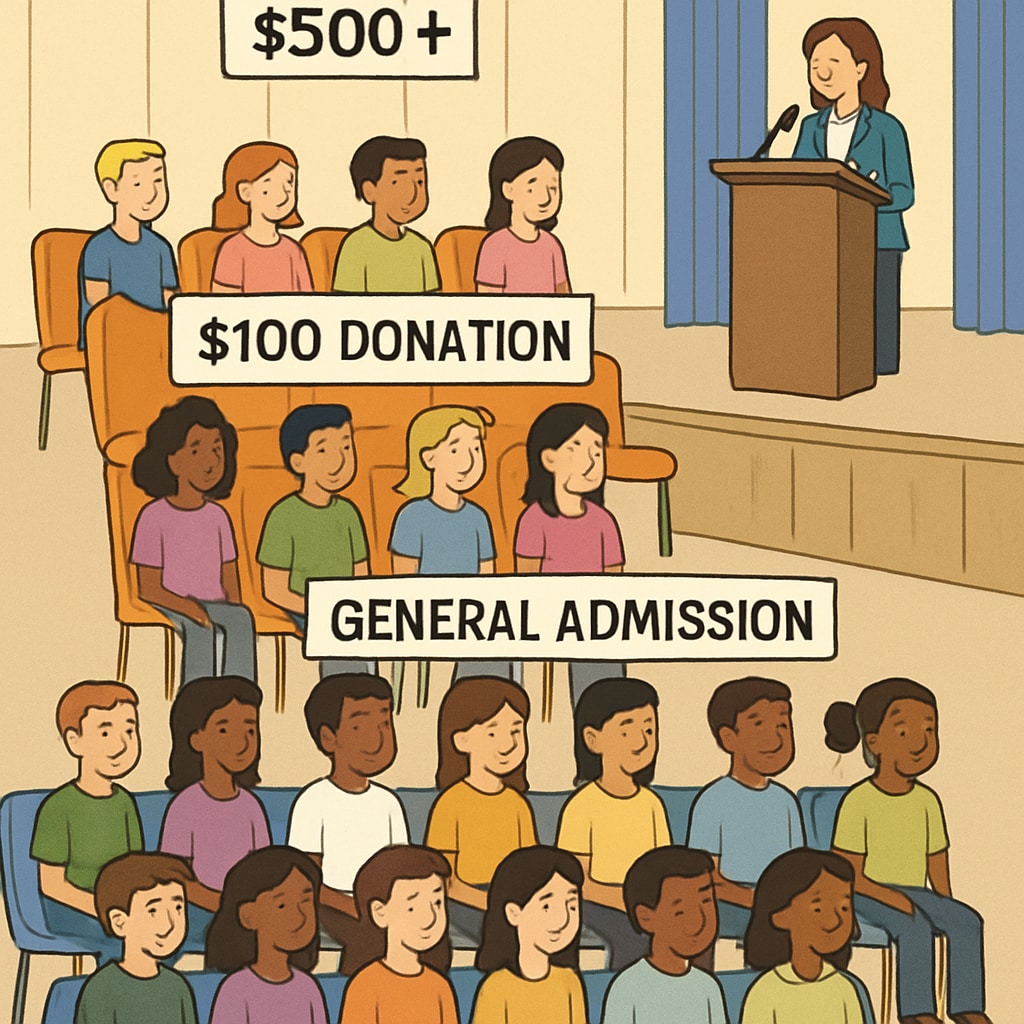School fundraising models that assign privilege tiers based on donation amounts have sparked concerns about fairness and economic discrimination. While these fundraising strategies may seem like a practical solution to financial shortfalls, they inadvertently highlight socio-economic disparities within the school community. This article examines how these practices impact students, families, and the broader goal of equitable education.
The Allure of Privilege-Based Fundraising
Many schools rely on fundraising to supplement budgets for extracurricular activities, facility upgrades, or specialized programs. However, some schools have adopted a tiered system where higher donations translate into exclusive benefits for families, such as priority parking at events, VIP seating at graduations, or even direct access to school administrators. Though intended to incentivize donations, these perks create a visible divide between families who can contribute large sums and those who cannot.

For example, a school might offer “gold” donors front-row seats at a school concert, while “silver” donors are seated further back and families unable to donate are left standing. While this approach may boost fundraising totals, it also raises questions about the values schools are promoting. Are schools unintentionally teaching children that financial contributions equate to worth and status?
The Impact on Students and Families
The implications of privilege-based fundraising go beyond immediate financial contributions. These systems can create feelings of exclusion and inferiority among students from less affluent families, potentially leading to social isolation. Children may notice the preferential treatment given to peers whose families donate more, which can foster resentment or damage self-esteem.
Additionally, families who are unable to contribute at higher levels may feel alienated from the school community. Parents might avoid school events altogether, fearing judgment or embarrassment. This can further deepen divisions within the school and undermine the sense of unity that educational institutions should strive to build.

Economic Disparities in Education
Education is often seen as a great equalizer, yet fundraising practices that prioritize privilege contradict this ideal. According to Britannica, economic inequality can perpetuate systemic barriers, limiting opportunities for those from disadvantaged backgrounds. In the context of schools, these fundraising models may widen the gap between students, reinforcing the very disparities education seeks to diminish.
Moreover, the psychological effects of these disparities should not be underestimated. Research indicates that children are highly sensitive to perceived inequality, which can influence their academic performance and social development. Schools that adopt privilege-based fundraising risk exacerbating these issues, prioritizing short-term financial goals over long-term student well-being.
Promoting Fairness in School Fundraising
To address these concerns, schools can adopt more equitable fundraising practices. For instance:
- Offer general benefits that apply to all families, regardless of donation size.
- Encourage anonymous donations to reduce visibility of contribution levels.
- Focus on community-building events where participation, not monetary contribution, is emphasized.
- Educate families about the importance of collective support, stressing that every contribution matters.
By implementing these strategies, schools can create a more inclusive environment while still meeting their financial needs. Additionally, transparency in how funds are used can help build trust and encourage broader participation.
Conclusion: Rethinking School Fundraising
While fundraising is a necessary component of many schools’ operations, tying privilege to donation amounts raises significant ethical and social concerns. These practices not only highlight economic disparities but also risk alienating segments of the school community. By shifting towards fairer, more inclusive models, schools can uphold the principles of equity and ensure that all students have access to a supportive and unified educational experience.
Ultimately, schools must ask themselves: Are we prioritizing financial contributions at the expense of our educational values? By addressing these questions and adopting equitable practices, schools can create a fundraising model that benefits everyone, not just a privileged few.
Readability guidance: The article uses clear, concise language with short paragraphs and bullet points to enhance readability. Overuse of technical terms is avoided, and transitions like “however,” “for example,” and “in addition” are used to maintain flow.


